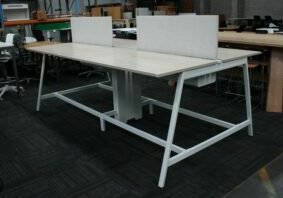
What effect does office furniture have on the environment?
The production, use, and disposal of office furniture can have a significant impact on the environment. Here are some of the key areas of concern:
Production:
- Resource Depletion: The manufacturing process often requires the extraction of natural resources like wood, metal, and plastic, which can contribute to deforestation and resource scarcity.
- Energy Consumption: The production process, including energy-intensive activities like cutting, shaping, and finishing materials, can generate significant greenhouse gas emissions.
- Chemical Use: The use of harmful chemicals, such as solvents and adhesives, during manufacturing can pollute air and water.
Use:
- Energy Consumption: Office furniture can indirectly contribute to energy consumption through the need for lighting and heating/cooling of office spaces.
- Indoor Air Quality: Some furniture materials, especially those with low-quality finishes or containing volatile organic compounds (VOCs), can release harmful chemicals into the indoor air, affecting the health of occupants.
Disposal:
- Landfill Waste: When office furniture reaches the end of its useful life, it often ends up in landfills, contributing to waste accumulation and environmental degradation.
- Pollution: Improper disposal or incineration of furniture can release toxic substances into the air and soil.
Mitigating the Impact:
To reduce the environmental impact of office furniture, businesses can consider the following strategies:
- Sustainable Sourcing: Choose furniture made from sustainably sourced materials, such as certified wood or recycled content.
- Energy-Efficient Design: Opt for furniture that is designed to minimize energy consumption, such as task lighting solutions and energy-efficient materials.
- Indoor Air Quality: Prioritize furniture with low VOC emissions and non-toxic finishes to improve indoor air quality.
- Extended Product Lifespan: Invest in durable, high-quality furniture that can last longer, reducing the need for frequent replacements.
- Recycling and Reuse: Implement furniture recycling programs and consider refurbishing or repurposing existing furniture to reduce waste.
- Sustainable Disposal: Dispose of furniture responsibly, ensuring it is recycled or disposed of in an environmentally friendly manner.
By making informed choices and adopting sustainable practices, businesses can significantly reduce the environmental impact of their office furniture and contribute to a more sustainable future.





